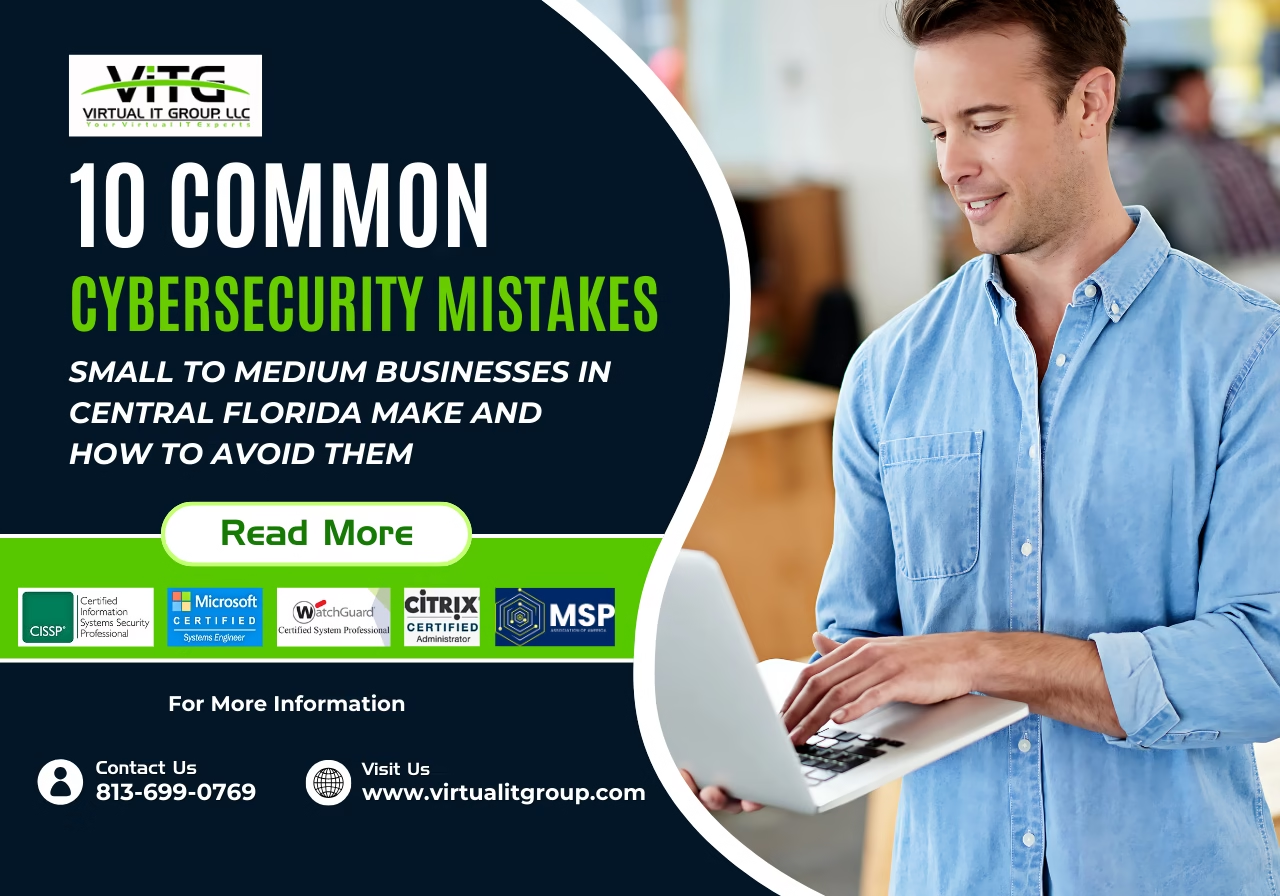Common Cybersecurity Mistakes are among the most pressing issues for small to medium-sized businesses (SMBs) across Central Florida. As cyberattacks become increasingly sophisticated, many businesses unknowingly make critical mistakes in their cybersecurity strategies that leave them exposed to costly breaches. These mistakes can result in devastating consequences like data theft, financial losses, and irreparable damage to your company’s reputation.
For Central Florida SMBs, protecting your digital infrastructure is not a luxury but a necessity. While large corporations often face the brunt of cybercriminal attention, small businesses are equally vulnerable to these evolving threats. Unfortunately, many SMBs overlook common cybersecurity mistakes that jeopardize their data security, creating an open door for attackers.
This guide will walk you through the 10 most common cybersecurity mistakes that SMBs in Central Florida tend to make. You’ll learn how to identify these vulnerabilities and take actionable steps to enhance your security measures, ensuring your business is protected against the ever-growing threat landscape.
Table of Contents
- Introduction
- 1. Failing to Implement Strong Password Policies
- 2. Neglecting Regular Software and System Updates
- 3. Not Using Multi-Factor Authentication (MFA)
- 4. Inadequate Employee Cybersecurity Training
- 5. Poor Data Backup Practices
- 6. Failing to Encrypt Sensitive Data
- 7. Lack of Network Monitoring and Incident Response
- 8. Insufficient Use of Firewalls and Endpoint Security
- 9. Ignoring Mobile Device Security
- 10. Not Creating a Comprehensive Cybersecurity Strategy
- How ViTG Can Help Your Business Stay Ahead
- Comprehensive 24/7 Cybersecurity Monitoring
- Rapid Incident Response & Remediation
- Proactive Vulnerability Management and Patch Management
- Network Security and Advanced Threat Prevention
- Employee Cybersecurity Awareness Training
- Data Encryption and Secure Backup Solutions
- Disaster Recovery and Business Continuity
- Compliance and Risk Management
- Conclusion: How to Strengthen Your Cybersecurity and Protect Your Business
- Frequently Asked Questions (FAQs)

10 Common Cybersecurity Mistakes Small to Medium Businesses in Central Florida Make and How to Avoid Them
1. Failing to Implement Strong Password Policies
One of the most common cybersecurity mistakes small to medium businesses in Central Florida make is using weak passwords or allowing employees to use easily guessable credentials. Passwords are often the first line of defense against unauthorized access, but many businesses fail to enforce strong password practices.
How to Fix This Mistake:
- Enforce Strong Password Policies: Ensure that passwords are at least 12 characters long and include a mix of uppercase and lowercase letters, numbers, and special characters.
- Use a Password Manager: Encourage employees to use password managers to store and generate secure passwords.
- Implement Regular Password Changes: Require employees to update their passwords every 90 days.
2. Neglecting Regular Software and System Updates
Many Central Florida SMBs overlook the importance of software updates. Cybercriminals often exploit vulnerabilities in outdated software to gain access to business systems. Whether it’s an operating system, antivirus software, or a web application, outdated systems are an open door for hackers.
How to Fix This Mistake:
- Enable Automatic Updates: Set your systems to update automatically to ensure that security patches and bug fixes are always installed promptly.
- Create an Update Schedule: Regularly check for software updates and ensure that all systems, applications, and devices are up-to-date.
3. Not Using Multi-Factor Authentication (MFA)
Another critical cybersecurity mistake that SMBs make is failing to implement multi-factor authentication (MFA). MFA adds an extra layer of security by requiring users to provide two or more verification methods to access an account, making it significantly harder for attackers to gain unauthorized access.
How to Fix This Mistake:
- Enforce MFA for All Accounts: Ensure that all sensitive accounts, such as email, CRM, and financial software, require MFA.
- Use MFA on Remote Access: Apply MFA for employees accessing the network remotely, especially when working from home or traveling.
4. Inadequate Employee Cybersecurity Training
Your employees are often the first line of defense against cyberattacks. Phishing emails, social engineering attacks, and malware are all threats that exploit human error. Many Central Florida businesses fail to provide proper cybersecurity training, leaving employees vulnerable to these attacks.
How to Fix This Mistake:
- Conduct Regular Cybersecurity Training: Offer ongoing training sessions to educate employees about phishing, password security, and safe online practices.
- Run Phishing Simulations: Regularly test employees with simulated phishing attacks to help them recognize suspicious emails.

10 Common Cybersecurity Mistakes Small to Medium Businesses in Central Florida Make and How to Avoid Them
5. Poor Data Backup Practices
Failing to implement proper data backup procedures is a significant mistake that leaves businesses vulnerable to ransomware attacks and data loss. Without regular backups, businesses risk losing crucial data that can affect their operations and reputation.
How to Fix This Mistake:
- Use Automated Backups: Set up automated backups for all critical business data and store them in a secure, off-site location.
- Test Your Backups Regularly: Ensure that backup files are recoverable by testing the restoration process periodically.
6. Failing to Encrypt Sensitive Data
Encryption is essential for protecting sensitive data from unauthorized access. Many Central Florida SMBs fail to encrypt data both in transit and at rest, making it vulnerable to cybercriminals.
How to Fix This Mistake:
- Encrypt Sensitive Data: Implement encryption for sensitive data stored on your servers, cloud platforms, and devices.
- Use SSL/TLS for Web Traffic: Ensure that your website and online services use SSL/TLS encryption to protect customer data during transmission.
7. Lack of Network Monitoring and Incident Response
Without proper network monitoring, it’s challenging to detect and respond to suspicious activities in real-time. Many businesses fail to monitor network traffic for potential breach indicators, which can lead to prolonged exposure to cyber threats.
How to Fix This Mistake:
- Implement Network Monitoring Tools: Use SIEM (Security Information and Event Management) systems to detect unusual activity and potential breaches.
- Create an Incident Response Plan: Develop a clear incident response plan that outlines the steps to take in the event of a breach.
8. Insufficient Use of Firewalls and Endpoint Security
A firewall is a basic yet essential security tool for businesses, yet many Central Florida SMBs fail to properly configure or use firewalls and endpoint security software. Firewalls act as a barrier between your network and malicious external traffic.
How to Fix This Mistake:
- Use Next-Generation Firewalls (NGFW): Implement next-gen firewalls that provide more advanced threat protection, including deep packet inspection.
- Deploy Endpoint Protection: Install antivirus and antimalware software on all devices connected to your network.
9. Ignoring Mobile Device Security
In today’s mobile-first world, employees often use their smartphones and tablets to access business resources. However, many businesses fail to secure these devices, leaving them vulnerable to threats such as mobile malware and data theft.
How to Fix This Mistake:
- Implement Mobile Device Management (MDM): Use MDM software to enforce security policies on all mobile devices accessing your business network.
- Require Encryption on Mobile Devices: Ensure all company devices are encrypted to protect data in the event of theft or loss.
10. Not Creating a Comprehensive Cybersecurity Strategy
Many SMBs fail to create a comprehensive cybersecurity strategy that covers all aspects of their IT infrastructure. Without a clear plan, businesses often miss crucial security measures and are left vulnerable to attacks.
How to Fix This Mistake:
- Develop a Cybersecurity Strategy: Work with cybersecurity experts to create a holistic strategy that covers everything from employee training to system updates and incident response.
- Regularly Review and Update the Strategy: As threats evolve, your strategy should be regularly updated to address new vulnerabilities.

10 Common Cybersecurity Mistakes Small to Medium Businesses in Central Florida Make and How to Avoid Them
How ViTG Can Help Your Business Stay Ahead
Cybersecurity has never been more critical for small to medium-sized businesses, especially in Central Florida. At Virtual IT Group (ViTG), we specialize in delivering proactive, cutting-edge cybersecurity solutions customized specifically to meet the goals of businesses in the region. Whether you are a small start-up or a growing business, ViTG has the expertise to ensure your data, network, and infrastructure are secure from evolving cyber threats. Below are some of the key ways ViTG supports businesses like yours in staying secure.
Comprehensive 24/7 Cybersecurity Monitoring
Effective security begins with vigilant monitoring. ViTG employs state-of-the-art cybersecurity monitoring tools that provide around-the-clock surveillance of your IT systems. Our 24/7 monitoring ensures that we can identify and neutralize threats in real-time, often before they can cause significant damage.
- Real-time Threat Detection: Our proactive approach ensures that any suspicious activity is flagged and addressed immediately, minimizing potential risks.
- Vulnerability Scanning: We conduct regular scans to identify any weaknesses in your systems and network, taking swift action to mitigate them before they are exploited.
Rapid Incident Response & Remediation
If an attack occurs, time is of the essence. ViTG is equipped with an agile incident response protocol designed to contain and resolve cybersecurity incidents swiftly, minimizing downtime and operational disruption.
- Incident Containment: In the event of a breach, our team isolates the affected areas to prevent further spread of the attack.
- Data Recovery: We use advanced data recovery tools to restore your critical business data quickly, ensuring business continuity.
- Post-Incident Analysis: After addressing the immediate incident, we perform a thorough analysis to uncover how the attack occurred and to implement additional preventive measures.
Proactive Vulnerability Management and Patch Management
At ViTG, we understand that vulnerabilities are the gateway to cyberattacks. That’s why we take a proactive approach to keep your network secure by regularly assessing and addressing potential weaknesses. Our patch management services ensure your systems are always up to date with the latest security patches.
- Regular System Assessments: We conduct periodic vulnerability assessments to detect and address any gaps in your security measures.
- Timely Patching: Our team ensures that your software, applications, and systems are consistently patched to prevent exploits of known vulnerabilities.

10 Common Cybersecurity Mistakes Small to Medium Businesses in Central Florida Make and How to Avoid Them
Network Security and Advanced Threat Prevention
Your network is the backbone of your business, and its protection is paramount. ViTG deploys next-gen firewall solutions to protect your business from external threats, including DDoS attacks, malware, ransomware, and other malicious activity.
- Firewall Solutions: We implement next-generation firewalls (NGFWs) to provide intelligent, real-time defense against a wide range of cyberattacks.
- Endpoint Protection: Our endpoint protection services secure your devices, including desktops, laptops, and mobile devices, from unauthorized access and malware.
Employee Cybersecurity Awareness Training
The weakest link in most businesses’ cybersecurity is often human error. ViTG offers comprehensive security awareness training to help your team recognize phishing attempts, suspicious behavior, and other threats. Regular training helps cultivate a culture of cybersecurity awareness and reduces the risk of successful attacks.
- Simulated Phishing Attacks: We run phishing simulations to test employees’ awareness and improve their response to real-world attacks.
- Ongoing Education: We provide continuous learning opportunities to ensure that employees stay up-to-date on the latest security best practices.
Data Encryption and Secure Backup Solutions
Sensitive data is the lifeblood of any business. Ensuring its protection is a priority at ViTG. We offer advanced data encryption services that ensure your information is secure both in transit and at rest. In addition, our automated backup solutions ensure your business can recover from any data loss incident.
- Data Encryption: We encrypt sensitive data across all devices, both on your network and remotely, to protect it from unauthorized access.
- Backup Solutions: We provide cloud-based backup solutions that store data securely in offsite locations, making it easy to restore in the event of a cyberattack or system failure.
Disaster Recovery and Business Continuity
The unforeseen is always a possibility, but with ViTG, your business can be prepared for the worst. Our disaster recovery solutions ensure that you can restore lost data quickly and continue operations with minimal downtime.
- Automated Backups: Your critical data is backed up regularly to prevent any loss during an incident.
- Rapid Data Restoration: In case of a ransomware attack or system failure, our team can rapidly restore your data to keep your business running.
Compliance and Risk Management
In the modern business landscape, compliance with industry regulations is essential. Whether you operate in finance, healthcare, or another regulated industry, ViTG helps you meet compliance requirements by implementing the necessary security protocols and performing regular audits.
- HIPAA, PCI-DSS, and GDPR Compliance: We ensure that your systems are in line with regulations such as HIPAA, PCI-DSS, and GDPR, helping you avoid fines and legal complications.
- Risk Assessment: We assess your business’s security risks and help you implement strategies to mitigate potential threats while remaining compliant.

10 Common Cybersecurity Mistakes Small to Medium Businesses in Central Florida Make and How to Avoid Them
Conclusion
Small to medium businesses in Central Florida must prioritize cybersecurity to protect their data, reputation, and bottom line. By avoiding these 10 common cybersecurity mistakes, your business can strengthen its defenses and minimize the risks posed by modern cyber threats. Proactively securing your IT infrastructure and ensuring your employees are well-trained will keep your business network safe from breaches.
By partnering with ViTG’s comprehensive cybersecurity services, you gain access to cutting-edge technologies, rapid incident response, and customized security strategies that are personalized to the unique goals of your business. Our team is dedicated to helping you safeguard your data, protect your reputation, and ensure that your business remains resilient in the face of evolving cyber threats.
Schedule FREE consultation today to learn more about how we can help you implement robust cybersecurity solutions and keep your business secure. Alternatively, you can visit our website and maximize our web chat, we are ready to help you build a more secure future.
Frequently Asked Questions (FAQs)
How can I protect my business from cyber threats?
Protect your business by implementing strong passwords, using multi-factor authentication, conducting regular employee cybersecurity training, and partnering with an experienced managed IT service provider for ongoing support.
Why is cybersecurity important for small businesses in Central Florida?
Small businesses are often targeted by cybercriminals due to limited security resources. ViTG offers customized cybersecurity solutions that help small businesses safeguard their sensitive data, prevent data breaches, and protect customer confidence.
What is disaster recovery, and why is it essential?
Disaster recovery involves strategies and tools that help businesses restore data and resume operations after a cyberattack or disaster. ViTG’s disaster recovery solutions ensure your business can bounce back quickly, minimizing downtime and operational impact.
How often should I conduct vulnerability scans for my business?
We recommend conducting vulnerability scans at least quarterly. However, if your business frequently updates systems or software, it’s essential to scan after each major change to address new potential vulnerabilities.
How can ViTG help me comply with cybersecurity regulations?
ViTG helps businesses stay compliant with regulations such as HIPAA, PCI-DSS, and GDPR by implementing the necessary security measures, performing regular audits, and ensuring all data handling practices align with industry standards.
What is Zero Trust Security, and how does it work?
Zero Trust is a security model that assumes no one, whether inside or outside the network, should be trusted by default. It continuously verifies user identities, device health, and access privileges. This approach helps prevent unauthorized access and minimizes security risks by limiting access to only what’s necessary.
How often should I update my business’s security software?
To keep your systems secure, you should update your security software regularly. At a minimum, conduct updates every month. However, updates should also be installed immediately when security patches are released to address critical vulnerabilities.
What is endpoint security, and why is it important?
Endpoint security involves securing devices like desktops, laptops, and mobile devices that connect to your business network. It’s critical because cybercriminals often target endpoints to gain unauthorized access to the network. Using antivirus software, firewalls, and device encryption can help protect endpoints.
Why should I consider working with a managed IT service provider (MSP) for cybersecurity?
Working with a managed IT service provider like ViTG ensures that your business has access to the latest cybersecurity tools, regular monitoring, quick incident response, and expert guidance. MSPs provide 24/7 support, allowing you to focus on your business while leaving cybersecurity to the professionals.

